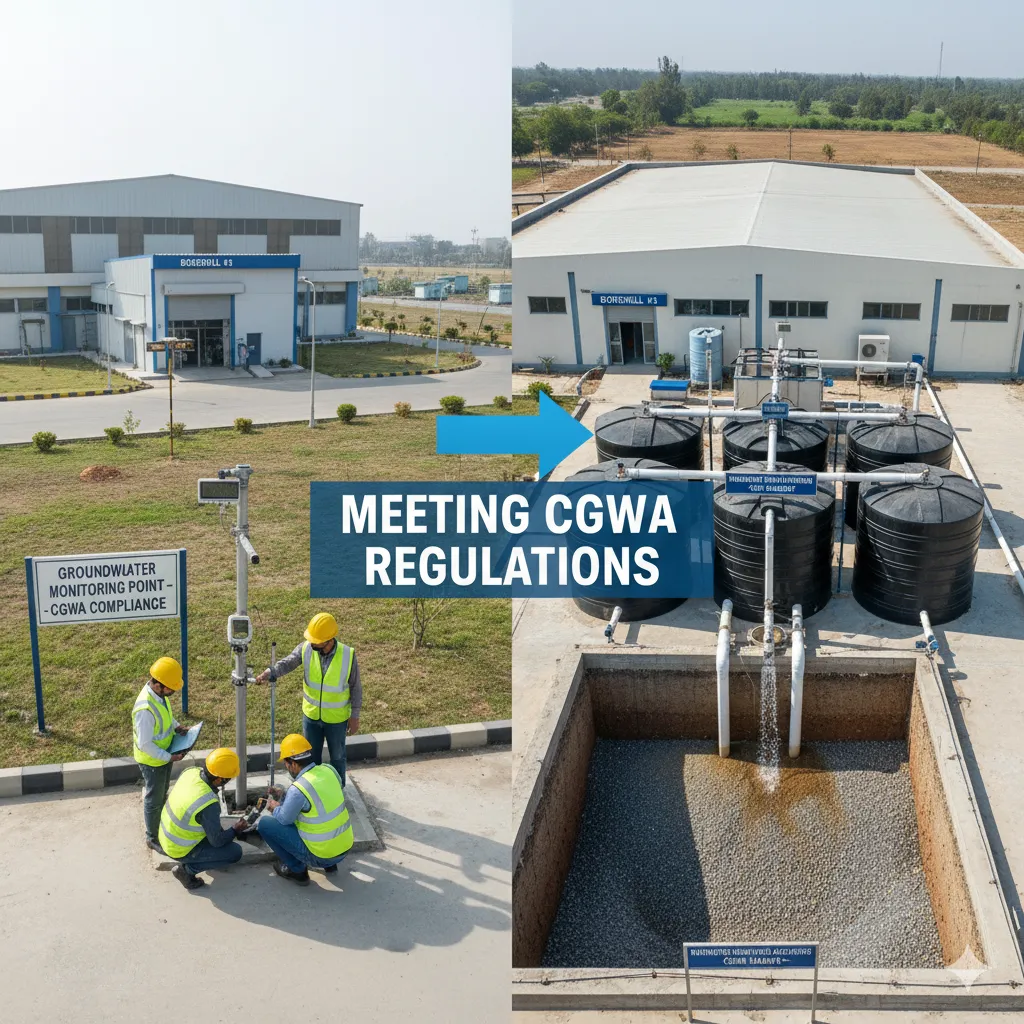Groundwater plays a vital role in sustaining industries, agriculture, and urban communities. However, unregulated extraction has led to severe depletion, land subsidence, and contamination in many parts of India. Recognizing this alarming trend, the Central Ground Water Authority (CGWA) has enforced strict norms for groundwater withdrawal, especially for industries and large housing societies.
Two of the most crucial requirements under these regulations are:
Installation of piezometer observation wells for groundwater monitoring.
Implementation of rainwater harvesting systems for aquifer recharge.
These measures are not just bureaucratic formalities. They are essential for ensuring water security and sustainable usage for future generations. At Vishal Borewell Drilling Service, we have over four decades of expertise in helping industries, institutions, and societies meet these norms with professional precision.
Understanding CGWA Regulations for Borewell and Groundwater Use
The CGWA mandates that any industry, infrastructure project, or housing society extracting groundwater must obtain a No Objection Certificate (NOC) before drilling or operating borewells.
As per CGWA guidelines:
A piezometer observation well must be installed within the premises.
The piezometer must be fitted with a digital water level recorder (DWLR) with telemetry to transmit real-time groundwater data.
Rainwater harvesting systems and groundwater recharge structures must be constructed to compensate for extracted water.
A water audit report and periodic compliance reports must be submitted to the authorities.
Flow meters are required to measure extraction volumes.
Extraction is allowed only within the limits approved in the NOC.
Failing to comply with these regulations can lead to penalties, cancellation of operations, and in severe cases, sealing of borewells.
Role of Piezometers in Groundwater Monitoring
A piezometer is essentially a monitoring well drilled for the specific purpose of measuring groundwater levels. Unlike a production borewell, it is not used for pumping water but for observing aquifer conditions.
Key functions of piezometers include:
Measuring static groundwater levels.
Recording seasonal fluctuations before and after monsoon.
Providing long-term data for sustainable water management.
Ensuring industries remain within CGWA-approved extraction limits.
Creating a transparent record for regulatory authorities.
Modern piezometers equipped with DWLR and telemetry systems allow automatic monitoring and online submission of data, reducing human error and improving compliance efficiency.
Importance of Rainwater Harvesting in CGWA Compliance
Rainwater harvesting (RWH) is another mandatory requirement under CGWA norms. It involves collecting, storing, and channeling rainwater into recharge pits, trenches, or injection wells to replenish groundwater reserves.
Technical benefits of RWH include:
Increasing groundwater table levels, particularly after monsoon.
Reducing pressure on borewells during dry seasons.
Preventing urban flooding by diverting stormwater.
Enhancing long-term water availability for industries and societies.
When properly designed, RWH structures can compensate for a significant portion of the water extracted, ensuring sustainability and regulatory compliance.
Benefits of Following CGWA Norms
For Industries:
Regulatory Safety: Smooth approval of borewell NOCs without legal disputes.
Operational Continuity: No risk of borewell sealing or production halts.
Cost Savings: Rainwater recharge reduces long-term borewell deepening costs.
Brand Reputation: Demonstrates corporate responsibility in water management.
For Housing Societies:
Reliable Water Supply: Prevents borewell drying during summer months.
Lower Water Bills: Reduced dependence on tanker supply.
Community Sustainability: Protects aquifers for long-term use.
Compliance Ease: Avoids penalties and legal complications.
Drawbacks of Not Following CGWA Rules
For Industries:
Legal Penalties: Heavy fines and revocation of borewell permissions.
Production Risk: Sealing of borewells can halt manufacturing units.
Rising Costs: Without recharge, borewells must be drilled deeper at higher expenses.
Reputation Loss: Non-compliance damages brand credibility.
For Societies and Communities:
Water Shortage: Borewells may run dry, forcing reliance on expensive tanker water.
Groundwater Depletion: Over-extraction lowers the water table, affecting nearby areas.
Social Conflicts: Disputes between residents over water availability.
Environmental Damage: Land subsidence and declining vegetation due to falling groundwater.
Impact on Groundwater If Regulations Are Ignored
When piezometers are not installed and rainwater harvesting is neglected, the groundwater cycle is disrupted:
Declining Water Table: Without recharge, the extraction outpaces natural replenishment.
Seasonal Stress: Post-monsoon recharge is lost, leading to summer shortages.
Water Quality Issues: Falling levels often lead to salinity, fluoride, or arsenic contamination.
Aquifer Damage: Over-extraction reduces aquifer pressure, leading to long-term irreversible damage.
Community Impact: Even compliant societies and industries nearby suffer due to reckless users.
Thus, compliance is not only a legal obligation but a moral responsibility towards communities and the environment.
How Vishal Borewell Helps Industries and Societies
With 40+ years of expertise, Vishal Borewell Drilling Service is a trusted partner for CGWA compliance. We provide end-to-end solutions, including:
Piezometer observation well drilling and installation.
DWLR (Digital Water Level Recorder) with telemetry.
Custom-designed rainwater harvesting systems.
Geological and hydrogeological surveys for groundwater mapping.
Flow meter installation for accurate extraction monitoring.
Borewell drilling, cleaning, and maintenance services.
CGWA consultancy and documentation support.
We focus on delivering technically sound, sustainable, and cost-effective solutions for both industries and residential societies.
Conclusion
The role of piezometers and rainwater harvesting goes beyond regulatory compliance. They are essential tools for protecting India’s groundwater resources, ensuring uninterrupted water supply, and safeguarding communities.
Following CGWA borewell regulations provides clear benefits—sustainability, cost savings, and long-term security. On the other hand, ignoring these rules leads to shortages, penalties, and irreversible aquifer damage.
At Vishal Borewell Drilling Service, we help industries, housing societies, and institutions adopt best practices in groundwater management. Together, we can ensure a future where water is secure, sustainable, and available for all.
📞 Contact us today at 8469877021 or visit 🌐 vishalborewell.com
